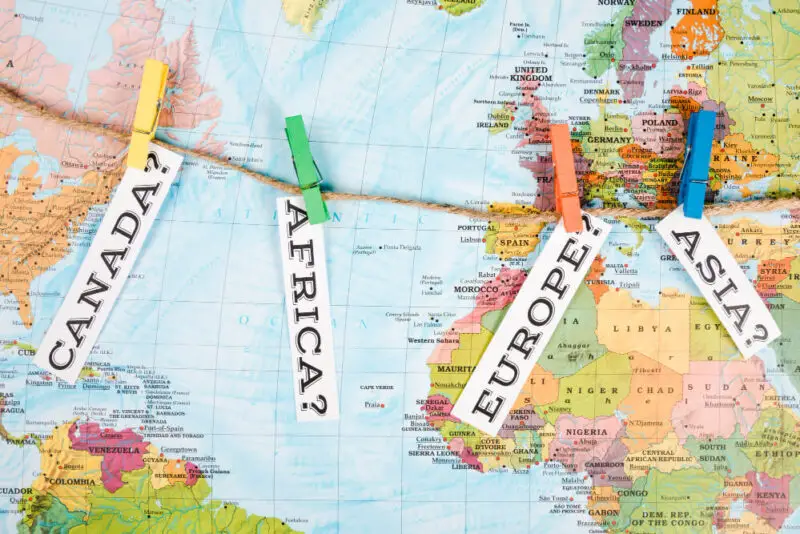When it comes to political processes involving the division or fragmentation of a larger entity, two terms often come to mind: devolution and balkanization. While they share some similarities, it is crucial to understand the key differences between them. In this article, we will explore the definitions, causes, benefits, challenges, and global examples of both devolution and balkanization.
Key Takeaways
- Devolution refers to the voluntary transfer of power from a central government to state, regional, or local authorities, while balkanization describes the division or fragmentation of a larger sovereign state or region into smaller, often ethnically similar, regions or states.
- Devolution is often a planned and peaceful process, promoting greater autonomy and tailored governance at the regional level. Balkanization, however, is often accompanied by conflicts, ethnic tensions, and territorial disputes.
- The causes of devolution can range from demands for greater regional autonomy to cultural or ethnic differences, economic disparities, and spatial factors. Balkanization is often the outcome of ethnic, cultural, and religious differences, as well as imperialist and nationalist movements.
- The benefits of devolution include enhanced decision-making processes, local identity representation, and tailored governance. However, challenges such as power struggles and coordination issues may arise. Balkanization can provide smaller states with better representation and self-determination, but it also brings conflicts, economic instability, and the task of establishing new political structures.
- Global examples of devolution include the United Kingdom’s devolution to Scotland, Wales, and Northern Ireland, as well as Spain’s devolution to Basque Country and Catalonia. The breakdown of the Ottoman Empire in the Balkans and the dissolution of colonial empires in Eastern Europe and Africa serve as examples of balkanization.
What is Devolution?

Devolution refers to the voluntary transfer of power from a central government to state, regional, or local authorities. This process allows for greater autonomy and decision-making capabilities at the regional level. Devolution can occur in both federal and unitary systems of government and is typically a peaceful and planned process.
One of the key features of devolution is the delegation of specific powers and responsibilities from the central government to the regional authorities. These powers may include legislative, executive, and financial functions, allowing the regions to make decisions that are more tailored to their local needs and priorities. It is important to note that devolution is not a complete separation from the central government, but rather a sharing of power.
Devolution can foster a sense of local identity and representation as it enables regions to have a stronger voice in the decision-making process. This can result in policies and initiatives that better reflect the unique characteristics and challenges of each region. Additionally, devolution can promote a more efficient and effective governance system by decentralizing decision-making and reducing bureaucracy.
However, devolution is not without its challenges. Ensuring a proper balance of power between the central and regional authorities can be complex, as conflicts may arise over jurisdictional boundaries and decision-making processes. Coordination and cooperation between different regions can also pose challenges, particularly in areas where there are significant disparities in resource allocation and development.
| Benefits of Devolution | Challenges of Devolution |
|---|---|
|
What is Balkanization?

In contrast to devolution, balkanization refers to the division or fragmentation of a larger sovereign state or region into smaller, often ethnically similar, regions or states. The term “balkanization” originated from the breakup of the Balkan Peninsula, which was once ruled by the Ottoman Empire, into several smaller states. Balkanization is a complex process that is often accompanied by conflicts, ethnic tensions, and territorial disputes.
During balkanization, a once-unified entity becomes fragmented along ethnic lines, resulting in the formation of multiple smaller states or regions. This fragmentation occurs due to a variety of factors, ranging from historical, cultural, and religious differences to nationalist sentiments and aspirations for self-governance.
Causes and Effects of Balkanization
The causes of balkanization are deeply rooted in historical, social, and political contexts. Ethnic, cultural, and religious differences play a significant role in driving the process of balkanization. Nationalism, imperialism, and independence movements can also contribute to the division of a region or state.
Balkanization Causes
| Causes of Balkanization | Examples |
|---|---|
| Ethnic, cultural, and religious differences | The breakup of Yugoslavia into Bosnia and Herzegovina, Croatia, North Macedonia, Slovenia, and Serbia |
| Nationalism and independence movements | The dissolution of the Soviet Union into multiple independent states |
| Imperialism and anti-colonialism | The division of Africa during the Scramble for Africa |
| Actions of foreign powers | The partition of India and Pakistan by the British Empire |
While balkanization can provide certain benefits, such as the formation of smaller states that better represent the interests and identities of their populations, it also poses significant challenges. One of the primary challenges is the potential for conflicts to arise during the process of division, leading to ethnic tensions, territorial disputes, and sometimes even violence.
Economic stability and the establishment of new political structures can also be challenging during the aftermath of balkanization. Moreover, the division of a larger entity into smaller, fragmented states can have implications for regional cooperation, international relations, and governance.
Causes of Devolution
Devolution, the voluntary transfer of power from a central government to regional or local authorities, can be influenced by various factors. These factors contribute to the desire for greater regional autonomy and the establishment of self-governance within specific regions.
Factors Leading to Devolution
- Demands for Greater Regional Autonomy: One of the primary causes of devolution is the demand from different regions within a country for greater autonomy. This demand arises when regions feel that they can better address their unique needs and issues at the local level.
- Cultural or Ethnic Differences: Cultural or ethnic disparities often play a significant role in initiating devolutionary movements. When regions have distinct cultural identities or ethnic compositions, they may seek greater autonomy to preserve and promote their specific cultural heritage or protect their unique rights and interests.
- Economic Disparities: Economic disparities between different regions can also drive the demand for devolution. Regions experiencing economic disadvantages may believe that they can better address their economic challenges and promote development by having more control over their resources and decision-making processes.
- Spatial Factors: Spatial factors, such as remote frontiers or isolated communities, can contribute to the desire for devolution. Regions that are geographically distant from the central government may feel disconnected and neglected, leading to a desire for self-governance and decision-making authority.
These factors collectively shape the push for devolution, creating a sense of identity and fostering the desire for regional autonomy. Understanding these causes is crucial in comprehending the dynamics of political fragmentation.
| Country | Region(s) | Type of Devolution |
|—————|———————|——————————————- |
| United Kingdom| Scotland, Wales, and Northern Ireland | Devolved powers within a federal framework|
| Spain | Basque Country, Catalonia | Autonomous regions with varying degrees of self-governance |
| Canada | Quebec | Provincial autonomy with distinct French-speaking culture |
This table showcases examples of devolution from different countries, highlighting the regions that have achieved greater autonomy and a level of self-governance.
Causes of Balkanization
Balkanization, the division or fragmentation of a larger entity into smaller, often ethnically similar regions or states, occurs due to a variety of factors. These causes of division can range from ethnic, cultural, and religious differences to external influences and historical events.
Factors contributing to balkanization:
- Ethnic, cultural, and religious differences: These differences can lead to tensions and rivalries among different groups within a region, ultimately driving the desire for separate identities and self-governance.
- Nationalism: Strong feelings of nationalism can fuel aspirations for independence and the creation of new states, further exacerbating divisions.
- Imperialism and colonial legacy: The legacy of empire and colonial rule can leave behind socio-political divisions, as well as unresolved grievances and conflicts.
- Independence movements: Movements seeking self-determination and independence play a significant role in balkanization, as they strive to break away from a larger entity and form their own sovereign states.
- Anti-colonialism: Anti-colonial movements often lead to balkanization as former colonies pursue independence and autonomy.
- Foreign interference: The actions of foreign powers, either directly or indirectly, can influence regional divisions for their own political, economic, or strategic interests.
These factors intertwine and interact in complex ways, shaping the process of balkanization and its consequences. Understanding these causes is crucial for comprehending the dynamics of fragmentation and its implications for affected regions.
Benefits and Challenges of Devolution
Devolution offers several potential benefits that can contribute to more effective and responsive governance at the regional level. One of the key advantages is the ability to tailor policies and decision-making processes to the specific needs and preferences of the local communities. By empowering regional authorities, devolution fosters a sense of local identity and representation, allowing for greater participation and engagement from citizens.
This decentralized approach to governance promotes more efficient decision-making by bringing decision-makers closer to the people they serve. Regional governments can respond more quickly to local issues and implement policies that address the unique challenges faced by their communities. This localized decision-making process enhances accountability and transparency, as residents have a clearer understanding of who is responsible for key decisions.
However, devolution also presents challenges that need to be carefully addressed. One of the potential pitfalls is the risk of power struggles between central and regional authorities. The allocation of resources and decision-making authority can lead to conflicts as different levels of government seek to assert their influence. Effective coordination mechanisms and clear delineation of powers are essential to avoid these conflicts and ensure smooth governance.
Another challenge is the potential for further divisions within a country. Devolution is based on the idea of empowering regions and acknowledging their unique characteristics. However, this can also create divisions and regional disparities, especially if some regions have more resources or political power than others. Balancing regional autonomy with the need for national cohesion and equality can be a delicate task that requires effective policies and mechanisms for cooperation.
| Benefits of Devolution | Challenges of Regional Governance |
|---|---|
| Tailored governance at the regional level | Power struggles between central and regional authorities |
| Fostering a sense of local identity and representation | Potential divisions within a country |
| Promoting more efficient decision-making processes | Regional disparities and inequalities |
Benefits and Challenges of Balkanization
Balkanization can have both positive and negative consequences for the affected regions and populations. Let’s explore the benefits and challenges associated with this process.
Benefits:
- Balkanization can lead to the formation of smaller, ethnically homogeneous states. These states can better represent the interests and aspirations of their respective populations, allowing for more localized decision-making processes.
- Smaller states formed through balkanization may foster a sense of self-determination and cultural preservation. They provide opportunities for communities to protect and promote their unique cultural and religious identities.
Challenges:
- Balkanization often involves conflicts and territorial disputes. These disputes can arise due to differing claims over resources, historical legacies, and competing visions for political control.
- Ethnic tensions can also escalate during the process of balkanization, leading to violence and instability. It is essential to address and manage these tensions to ensure a peaceful transition.
- Economic instability is another challenge associated with balkanization. The fragmentation of a larger entity may disrupt established economic systems, supply chains, and trade relationships, potentially causing economic hardships.
- Establishing new political structures and governing systems is a complex task after balkanization. It requires building institutions, developing legal frameworks, and ensuring effective coordination among the newly formed states.
In summary, while balkanization may offer benefits such as increased representation and cultural preservation, it also brings challenges like conflicts, economic instability, and the establishment of new political structures.
Global Examples of Devolution and Balkanization
Devolution and balkanization are political phenomena that have occurred in various regions around the world. Understanding concrete examples of both processes can provide valuable insights into their dynamics and implications. Here are some notable instances of devolution and balkanization:
Examples of Devolution
Devolution has been implemented in several countries, resulting in the transfer of power from central governments to regional entities. One prominent example is the devolution of the United Kingdom.
In the United Kingdom, devolution has taken place in Scotland, Wales, and Northern Ireland. Each of these regions now has its own parliament or assembly, with varying degrees of legislative and decision-making powers. This devolutionary approach aims to accommodate regional differences and promote localized governance.
Another example is the devolution in Spain, particularly in the regions of Basque Country and Catalonia. These regions have been granted significant self-governing powers, including control over education, healthcare, and taxation.
Examples of Balkanization
The concept of balkanization originated from the fragmentation and division of the Balkan Peninsula during the breakup of the Ottoman Empire.
Various Balkan countries emerged as independent states, including Serbia, Montenegro, Bulgaria, and Albania. The process of balkanization in this region involved ethnic tensions, territorial disputes, and armed conflicts.
Balkanization has also been observed in other parts of the world, such as Eastern Europe and Africa, following the dissolution of colonial empires. In Eastern Europe, the disintegration of Yugoslavia resulted in the formation of several new nation-states, including Slovenia, Croatia, Bosnia and Herzegovina, and North Macedonia.
In Africa, the decolonization process led to a wave of balkanization as colonial powers withdrew, contributing to the formation of numerous independent nations characterized by ethnic and cultural divisions.
Overall, these examples highlight the diverse instances of devolution and balkanization, showcasing the various geographical contexts and historical circumstances in which these processes occur.
| Examples of Devolution | Examples of Balkanization |
|---|---|
| United Kingdom (Scotland, Wales, and Northern Ireland) | Balkan Peninsula (Serbia, Montenegro, Bulgaria, Albania) |
| Spain (Basque Country, Catalonia) | Eastern Europe (Slovenia, Croatia, Bosnia and Herzegovina, North Macedonia) |
| Africa (multiple independent nations) |
Conclusion
In conclusion, devolution and balkanization are two distinct political processes with significant differences in their causes, effects, and implications. Devolution involves the voluntary transfer of power from a central government to regional or local authorities, resulting in greater regional autonomy and more localized decision-making. On the other hand, balkanization refers to the division or fragmentation of a larger entity, often leading to conflicts, ethnic tensions, and territorial disputes.
Devolution offers the potential benefits of tailored governance at the regional level, fostering a sense of local identity, and promoting more efficient decision-making processes. However, it also presents challenges such as power struggles between central and regional authorities, the need for effective coordination, and the risk of further divisions within a country.
Balkanization, while promoting self-determination and the protection of cultural identities, is often accompanied by conflicts, territorial disputes, and economic instability. The process can also pose challenges in establishing new political structures and maintaining stability.
FAQ
What is the difference between devolution and balkanization?
Devolution refers to the voluntary transfer of power from a central government to state, regional, or local authorities. It allows for greater autonomy and decision-making capabilities at the regional level. Balkanization, on the other hand, describes the division or fragmentation of a larger sovereign state or region into smaller, often ethnically similar, regions or states. It is often accompanied by conflicts, ethnic tensions, and territorial disputes.
What does devolution mean?
Devolution is the voluntary transfer of power from a central government to state, regional, or local authorities. This process allows for greater autonomy and decision-making capabilities at the regional level.
What is balkanization?
Balkanization is the division or fragmentation of a larger sovereign state or region into smaller, often ethnically similar, regions or states. It is often accompanied by conflicts, ethnic tensions, and territorial disputes.
What are the causes of devolution?
Devolution can be caused by various factors, including demands for greater regional autonomy, cultural or ethnic differences, economic disparities, and spatial factors such as remote frontiers or isolated communities. These factors often create a sense of identity and the desire for self-governance within specific regions.
What are the causes of balkanization?
The causes of balkanization are often related to ethnic, cultural, and religious differences within a region. Other factors may include nationalism, imperialism, independence movements, anti-colonialism, and the actions of foreign powers promoting regional divisions for their own interests.
What are the benefits and challenges of devolution?
Devolution offers several potential benefits, such as allowing for tailored governance at the regional level, fostering a sense of local identity and representation, and promoting more efficient decision-making processes. However, it also presents challenges, such as the potential for power struggles between central and regional authorities, the need for effective coordination, and the risk of creating further divisions within a country.
What are the benefits and challenges of balkanization?
Balkanization can lead to the formation of smaller, ethnically homogeneous states that can better represent the interests of their respective populations. It can also promote self-determination and the protection of cultural and religious identities. However, balkanization often involves conflicts, territorial disputes, and the risk of ethnic tensions escalating into violence. It can also result in economic instability and the challenges of establishing new political structures.
Can you provide some global examples of devolution and balkanization?
Some global examples of devolution include the United Kingdom’s devolution to Scotland, Wales, and Northern Ireland, as well as Spain’s devolution to Basque Country and Catalonia. Balkanization has been observed in the Balkan Peninsula during the breakup of the Ottoman Empire, as well as in regions like Eastern Europe and Africa following the dissolution of colonial empires.
Source Links
- https://www.thoughtco.com/what-is-balkanization-1435451
- https://www.albert.io/blog/balkanization-ap-human-geography-crash-course-review/
- https://www.wlwv.k12.or.us/cms/lib/OR01001812/Centricity/Domain/1325/Crash Course Review – Devolution.pdf
Image Credits
Featured Image By – Freepik
Image 1 By – pressfoto on Freepik
Image 2 By – Ray Shrewsberry from Pixabay








